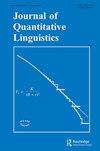A Comprehensive Study of the Parameters in the Creation and Comparison of Feature Vectors in Distributional Semantic Models
IF 1.7
2区 文学
0 LANGUAGE & LINGUISTICS
引用次数: 5
Abstract
ABSTRACT Measuring the semantic similarity and relatedness of words can play a vital role in many natural language processing tasks. Distributional semantic models computing these measures can have many different parameters, such as different weighting schemes, vector similarity measures, feature transformation functions and dimensionality reduction techniques. Despite their importance there is no truly comprehensive study simultaneously evaluating the numerous parameters of such models, while also considering the interaction of these parameters with each other. We would like to address this gap with our systematic study. Taking the necessary distributional information extracted from the chosen dataset as already granted, we evaluate all important aspects of the creation and comparison of feature vectors in distributional semantic models. Testing altogether 10 parameters simultaneously, we try to find the best combination of parameter settings, with a large number of settings examined in case of some of the parameters. Beside evaluating the conventionally used settings for the parameters, we also propose numerous novel variants, as well as novel combinations of parameter settings, some of which significantly outperform the combinations of settings in general use, thus achieving state-of-the-art results.分布语义模型中特征向量创建与比较的参数综合研究
摘要测量单词的语义相似性和关联性在许多自然语言处理任务中起着至关重要的作用。计算这些度量的分布语义模型可以具有许多不同的参数,例如不同的加权方案、向量相似性度量、特征转换函数和降维技术。尽管它们很重要,但还没有真正全面的研究同时评估这些模型的众多参数,同时考虑这些参数之间的相互作用。我们希望通过系统的研究来弥补这一差距。假设从所选数据集中提取的必要分布信息是理所当然的,我们评估了分布语义模型中特征向量的创建和比较的所有重要方面。同时测试总共10个参数,我们试图找到参数设置的最佳组合,在某些参数的情况下检查大量设置。除了评估传统使用的参数设置外,我们还提出了许多新的变体,以及参数设置的新组合,其中一些显著优于一般使用的设置组合,从而获得了最先进的结果。
本文章由计算机程序翻译,如有差异,请以英文原文为准。
求助全文
约1分钟内获得全文
求助全文
来源期刊

Journal of Quantitative Linguistics
Multiple-
CiteScore
2.90
自引率
7.10%
发文量
7
期刊介绍:
The Journal of Quantitative Linguistics is an international forum for the publication and discussion of research on the quantitative characteristics of language and text in an exact mathematical form. This approach, which is of growing interest, opens up important and exciting theoretical perspectives, as well as solutions for a wide range of practical problems such as machine learning or statistical parsing, by introducing into linguistics the methods and models of advanced scientific disciplines such as the natural sciences, economics, and psychology.
 求助内容:
求助内容: 应助结果提醒方式:
应助结果提醒方式:


